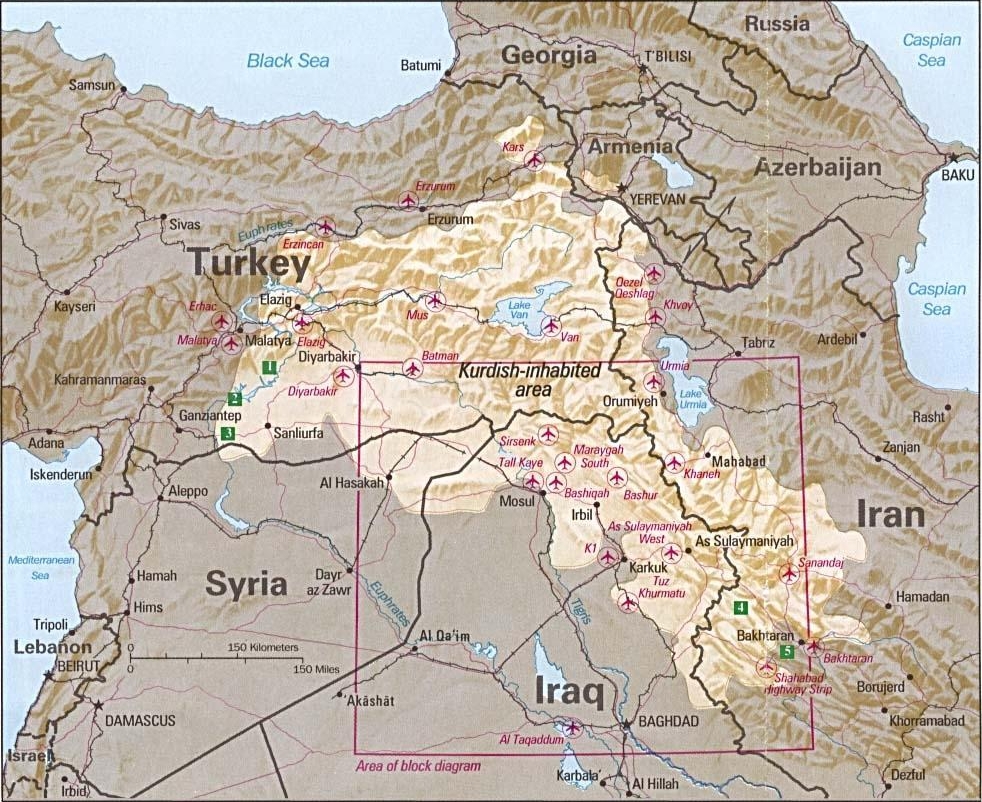By Bhavya

Right where Syria, Iran, Iraq and Turkey meet, is a geo-cultural area, the inhabitants of which are called the Kurds, hence the name, Kurdistan. A small, not-well-known region it might be, but if you speculate the possibility of consequences that Kurdistan seems to promise, you can do nothing but let in sink the momentum of the issue. On an introductory note, one must understand that it’s an issue which deals with all those countries it even barely borders, and all these countries deal with this geo-cultural area according to the differing environments within themselves.
Kurdistan falls in the nort heast of Syria, south east of Turkey, along the western border of Iran, and the whole north of Iraq.
If you look at it from a larger level, you realise that broadly speaking, the Kurds are fighting different battles, against different peoples for one cause at the moment. Their struggles and efforts are undoubtedly related to each other’s. Now, the roots of this go back to the time of the Ottoman Empire, within the temporal and cognitive premises of which the Kurds rose as an ethnic group. When the Ottoman Empire dissolved the area was split into four major territories.
Syria is a country currently engaged in a civil war for approximately three years now, and the belligerents involved are getting support from external forces as well. The more well-known of these external forces that support Mr Al-Assad are the Iranians and Hezbollah, while the other faction, led by the Free Syrian army, is not alone in the league – Israel has been a rather active partner in the effort to pull down the al-Assad regime. A parallel force emerges here, and this force is separatist in nature, and evidently, one can infer it wishes to remain independent. The Syrian Kurdistan campaign started in 2012, and the north eastern of the country is already being governed by the Kurds. Syria’s involvement with the Kurds becomes greater when we talk about Syria-Turkey relations.
This idea of autonomy, but during peace time, can be seen in Iraq. While today, the Kurds in Iraq enjoy great autonomy and economic liberty, Dr. Gareth Stansfield writes about the major stirrings among the Iraqi Kurds in the 1960s, “a torturous decade”, and also, it has been highlighted how, initially, the entire movement was greatly segmented due to the different economic backgrounds of different people at that time – for example, the differences between tribal groups and the urban intelligentsia. Internal differences have always been a very important element in deciding the success of that particular movement that host these differences – some of which turn greatly violent. Such difference can be seen after the Gulf War, when two armed rivals, Kurdish Democratic Party and Patriotic Union of Kurds fell into violent clashes during the country-wide 1991 uprisings in Iraq.
It is interesting how potentially dis integrative forces within a country can be effectively used by enemy countries against the particular state in mind. While we are talking about Iraq, we must make a mention of how Iranian Shah supported the KDP in 1974 to exert pressure on Iraq. However, Iran is not entirely detached from this Kurdish issue when taking in account its own case. Iran has its own Kurdish separatist issue going on, and currently, the Kurds here, the ones who choose to fight, are suppressed in an extremely harsh way, taking into account how Iran already faces so many human rights violation issues.
The Kurds seems to have had a very integrated, attached history in the Iranian context but tensions come later, after the First World War. Later, the 1979 revolution brought Ayatollah’s government to power, and a sense of intolerance can be understood in the way the approach different elements they deal with on a regular basis; that intolerance comes from the theocratic nature of the government. The Kurdish rebellion was crushed using military measures, because apparently, it was “contrary to Islamic doctrines”.
It must be understood that although Iranian Shah supported the Iraqi Kurdistan, it didn’t mean he was liberal with the Kurdish movement at home. So, for almost all the while, the governments that came and went in Iran never seemed to digest the idea of Kurdish autonomy. A report released by Amnesty International highlighted the worsening conditions of the Kurds in Iran – lack of social, religious and political freedom along with violent repression. The Party of Free Life of Kurdistan (PJAK in Kurdish) is an organization designated a terrorist organization by some international entities. They rose to prominence from the turn of the century. Now, when we are talking about the PJAK, we talk about foreign involvement as well.
Foreign involvement here doesn’t mean involvement of the government of a rival nation here. PJAK is supported by a larger Kurdish organization based in Turkey, called the PKK. PKK stands for Kurdistan Workers’ Party in Kurdish, and has been involved in armed struggle against the Turkish government. The whole Kurdish movement, one must understand, has been the strongest in Turkey. They occupy a significant portion of the territory and their populations are the largest here.
Turkey’s Kurdish problem goes back to the dissolution of Ottoman Empire at the end of the First World War and the whole issue gained a new sense of aggression in pursuit in the wake of forced assimilation carried out by the Turkish government then into the Turkish society. However, forced assimilation and incorporation and the consequential threat to culture and language become secondary as well as complimentary when larger political issues and power struggles assume importance. The rift between the nationalists and the Kurdish minority deepened with military measures deployed by the Turkish government in decades to come.Many rebellions and massacres are important elements of this movement here, since the process and the method of “assimilation” was obviously not welcomed by the Kurds.
The emergence of PKK in 1984 marks a revolutionary stage in this whole conflict and PKK’s external influences and a base of varied ideological approaches makes it different from other sorts of separatist movements. It started as a hard-core left-wing organization, but over time, it assumed democratic and secular characteristics. Also, PKK has these interesting elements of strong female guerrilla fighters, broadly highlighting the extent of tolerance among the cadres.
In case of international relations, it is interesting to see how all this works.
PKK’s presence in Iran through PJAK brings out the paradoxes in the Turkey-Iran relation, and how the interested parties benefit or lose from the many outcomes of this relation between PJAK and PKK. Back in 2011, both Turkey and Iran “vowed to collaborate” on eliminating this insurgency.
The PKK have a military presence in Iraqi Kurdistan as well, along with their offshoot in Iran. Also, considering the state of relations between Turkey and Syria, it’d be easier to imagine both supporting the agents of turbulence in each other’s territory. Al Jazeera reports Turkey being accused of kindling a proxy war against Syrian Kurds within Syria itself by supporting the rebels, despite Turkey’s denial on the matter.
The point is that these organizations seem to have an array of prospective allies when it comes to support and backing. One can speculate about how China might want to support PKK because Turkey seems to have a soft corner for the East Turkmenistan movement in the Chinese province of Xinjiang.
At the same time, one might want to discuss the viability of the separate nations that the Kurds have hoped for, while one may not dismiss this whole effort as vain, it must be understood that there are a lot of factors which will come as obstructions to the Kurds. The four Kurdistans apparently not want to come to peace with the idea of coming together as one nation. These people are all different inspite of belonging to the same cultural history. A part of this Geo-cultural area was even located in Persian Empire as well – proving the point that they are all indeed different. The issue of difference does not end here. While the whole movement is miles away from Islamist methods of persuasion, one must not forget that religious differences have arised from time to time, as not all Kurds are Sunni Muslims. Another sort of difference between them came from within the Kurds. Kurds deal with political aspirations – for instance in Turkey not all Kurds want independence, some want greater autonomy others are readily accepting the more humane measure the government is deploying to make peace within the region.
Further we have geographic influences on the economic factors in the region concerned. This Geo-cultural group is situated in mountains, and is definitely the most suitable for guerrilla warfare but the worst is to create and sustain a civilization. Turkey is in dire need of the south-east region because of sheer strategic importance of the region in military manoeuvres against its not-so-friendly neighbors. Along with this, Turkey receives oil from Iran and Iraq as well, probably, through this region. These are few amongst the many reasons and a reason why Turkey wouldn’t want to let it go, but an independent Kurdistan cannot make the best out of the strategic location of the territory until it has a fairly independent economy. As for Iraqi Kurdistan, while oil reserves are big support, the infrastructure to make the best out of this endowment still lacks.
Iranian Kurdistan is quietly sulking, suffering, it seems, while the Syrian one figuring out how to sustain its stronghold. The countries who bear the brunt of the violence can effectively come to peace, with a combination of solutions – economic and political allowances forming the most of it. As far as one can anticipate, this movement has the potential to grow into a full-fledged, near civil-strife-like struggle, the impact of which can potentially alter the power play in Middle East. It must not be judged by how well known it is around the world, though media coverage can be a great support to their cause. Understanding this whole Kurdish movement, with its increasing involvement in issues, completes ones understanding of the dynamic restless Middle East.































